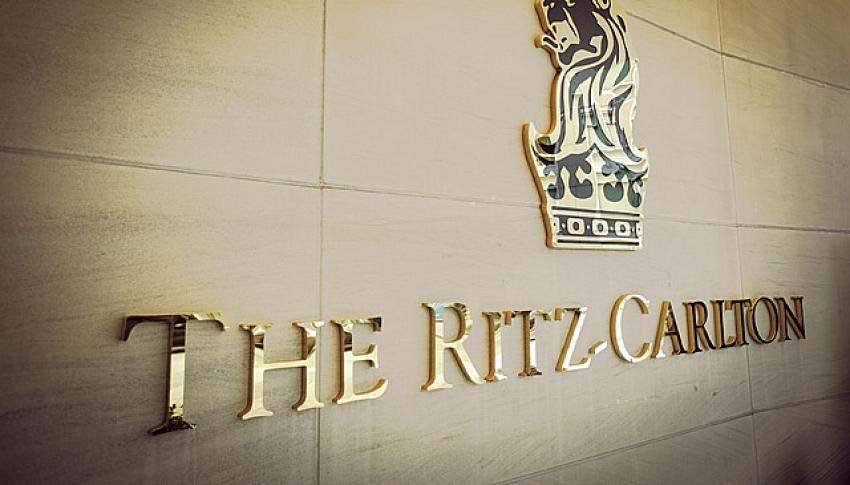The Ritz-Carlton Hotel Company, L.L.C. is a luxury hotel chain that operates 108 hotels and resorts in 30 countries and territories worldwide. The company is known for its impeccable service and elegant accommodations, and its properties are consistently ranked among the best hotels in the world.
The Ritz-Carlton brand was founded in 1888 by César Ritz, a Swiss hotelier who is considered to be one of the pioneers of the modern luxury hotel industry. Ritz’s hotels were known for their luxurious accommodations, impeccable service, and attention to detail. He was also one of the first hoteliers to introduce many of the amenities that are now taken for granted in luxury hotels, such as private bathrooms, fine dining restaurants, and 24-hour room service.
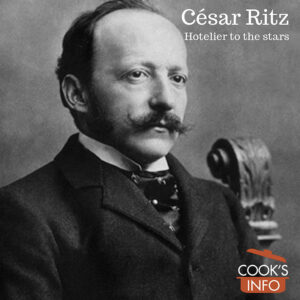
The Ritz-Carlton Hotel Company was established in 1983, and the first Ritz-Carlton hotel in the United States opened in New York City in 1981. The company quickly expanded, and today, Ritz-Carlton hotels can be found in major cities and resort destinations around the world.

Ritz-Carlton hotels are known for their elegant design, luxurious accommodations, and impeccable service. The company’s hotels typically feature spacious rooms and suites with high-quality furnishings and amenities. Many Ritz-Carlton properties also have world-class restaurants, spas, and fitness centers.
One of the things that sets Ritz-Carlton hotels apart from other luxury hotel chains is the company’s commitment to service. Ritz-Carlton employees are known for their attentiveness and willingness to go the extra mile for guests. The company’s motto is “Ladies and gentlemen serving ladies and gentlemen,” and this philosophy is evident in everything that Ritz-Carlton does.
The Ritz-Carlton experience extends beyond the luxurious accommodations and exquisite dining options. It encompasses a range of amenities and services designed to cater to the unique needs and desires of each guest. Whether it’s a rejuvenating spa treatment, a meticulously planned event, or an unforgettable culinary journey, the Ritz-Carlton consistently exceeds expectations.
Ritz-Carlton hotels are popular with both business and leisure travelers. The company’s hotels offer a variety of amenities and services to meet the needs of both groups, such as business centers, meeting rooms, and kids’ clubs.
Marketing Strategies of Ritz-Carlton Hotel
The Ritz-Carlton Hotel is renowned for its luxury and exceptional customer service. Their marketing strategies are designed to uphold and enhance this reputation while attracting and retaining high-end clientele. Let’s delve into their marketing strategies in detail:
1. Exceptional Customer Experience
The cornerstone of Ritz-Carlton’s marketing strategy is delivering an unparalleled customer experience. Ritz-Carlton Hotels have built their reputation on delivering exceptional CX, making it a key component of their overall marketing strategy. Here are five ways Ritz-Carlton implements exceptional CX as a marketing strategy:
Staff Training: Ritz-Carlton invests heavily in training their staff members to anticipate guest needs and provide personalized service. Employees learn how to recognize subtle cues and adapt their interactions accordingly, resulting in highly attentive and empathetic service.
Customization: Ritz-Carlton offers guests various options to tailor their stays according to preferences, whether it be room configurations, amenities, or special requests. This level of flexibility allows guests to feel pampered and valued, enhancing their overall satisfaction.
Memorable Moments: Ritz-Carlton employees go above and beyond to create lasting memories for guests. Whether it’s arranging surprise celebrations, offering thoughtful gestures, or simply sharing insider tips, these small but impactful actions leave a positive impression and strengthen brand loyalty.

Feedback Integration: Ritz-Carlton actively seeks feedback from guests to continually improve their services and facilities. By listening to constructive criticism and implementing changes based on suggestions, the hotel chain demonstrates a commitment to excellence and responsiveness to evolving consumer needs.
Consistency Across Locations: Ensuring consistent quality across all properties globally is crucial to upholding Ritz-Carlton’s high standards. By standardizing processes, training procedures, and service protocols, the hotel chain can guarantee a uniform level of luxury and comfort at every location, reinforcing trust and confidence in the brand.
They prioritize training and empowering their staff to go above and beyond in meeting guest expectations. This commitment to exceptional service is often communicated in their marketing materials and campaigns.
2. Targeted Branding
The Ritz-Carlton uses several tactics to implement its targeted branding strategy.
First, it creates a distinct visual identity that reflects its image as a luxury hotel. Its logo features elegant typography and a crest reminiscent of royal heraldry, which conveys a sense of refinement and exclusivity.
Second, it develops advertising campaigns that highlight its unique amenities and services, such as its signature Ritz-Carlton Club Level experience, which provides guests with dedicated concierge service and other VIP perks.
Third, it leverages digital platforms to reach potential customers and engage with existing ones. For instance, it has a strong presence on social media, where it shares images of its properties, showcases guest experiences, and responds to feedback from followers.
Finally, it partners with luxury brands and organizations that align with its own values and appeal to its target audience, such as fashion designers, art institutions, and culinary experts. These collaborations allow The Ritz-Carlton to expand its reach and enhance its prestige.
3. Personalization
Personalization is another important marketing strategy employed by The Ritz-Carlton hotel chain. It refers to the practice of customizing products, services, or communications based on individual preferences or characteristics of a particular group of consumers. In the case of The Ritz-Carlton, personalization plays a crucial role in delivering exceptional guest experiences and building lasting relationships with its clients.
One way The Ritz-Carlton personalizes its offerings is through its Ladies and Gentlemen program, which empowers employees to anticipate and meet guests’ needs without being prompted. Staff are trained to recognize repeat visitors and remember their preferences, such as room temperature settings, pillow types, or favorite drinks. This level of attentiveness helps create a sense of familiarity and comfort for returning guests, making them feel like valued members of the Ritz-Carlton community.
Another aspect of The Ritz-Carlton’s personalization approach is its focus on creating bespoke experiences for each guest. For example, the hotel offers customizable packages that include activities tailored to individuals’ interests, such as golf lessons, spa treatments, or exclusive tours of local attractions. Guests may also work with staff to plan special occasions, such as weddings or anniversaries, down to the smallest detail. This level of personalization allows The Ritz-Carlton to differentiate itself from competitors and build emotional connections with its clientele.
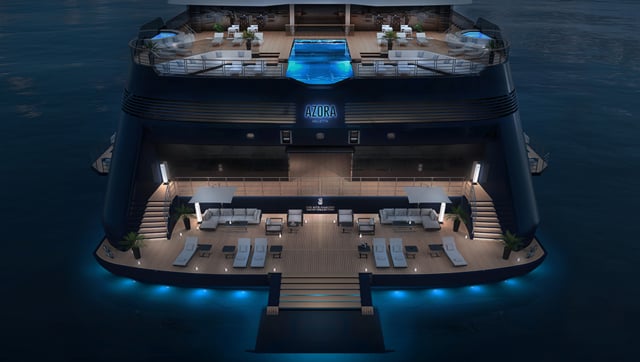
In addition to these direct forms of personalization, The Ritz-Carlton also leverages data analytics and artificial intelligence to better understand its guests’ behavior and preferences. By analyzing information collected through booking systems, loyalty programs, and other sources, the hotel can identify trends and make informed decisions about product development, pricing strategies, and marketing initiatives. This enables The Ritz-Carlton to provide more relevant and effective communication, which further strengthens its relationship with customers.
Overall, personalization is an essential component of The Ritz-Carlton’s marketing strategy because it enables the company to deliver highly individualized experiences that resonate deeply with its discerning client base. By investing in employee training, customizable offerings, technology, and data analysis, The Ritz-Carlton demonstrates its commitment to understanding and meeting the diverse needs and desires of its guests. As a result, the brand continues to stand out in a crowded hospitality industry and maintain its position as one of the most respected and sought-after luxury hotel chains in the world.
4. Content Marketing
Content marketing is a key element of The Ritz-Carlton’s overall marketing strategy, allowing the luxury hotel chain to share valuable insights, showcase its expertise, and connect with audiences across various channels. Here are some ways The Ritz-Carlton utilizes content marketing:
Blog posts: The Ritz-Carlton operates a blog called “The Ritz-Carlton Magazine,” which covers topics related to luxury travel, lifestyle, and culture. Through this platform, the hotel shares articles, interviews, and guides that cater to its affluent customer base. Examples of blog post titles include “5 Must-Visit Art Museums Around the World,” “How to Plan the Perfect Destination Wedding,” and “A Guide to Fine Dining Etiquette.”
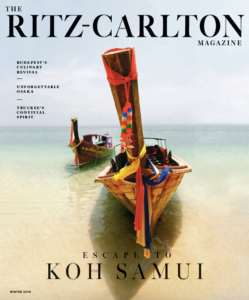
Social media: The Ritz-Carlton maintains active presences on multiple social media platforms, including Facebook, Instagram, Twitter, LinkedIn, and YouTube. On these channels, the hotel regularly publishes high-quality photos, videos, and stories that capture the essence of its upscale accommodations, dining experiences, and guest services. Additionally, The Ritz-Carlton engages with its followers by responding to comments, answering questions, and sharing user-generated content.
Email newsletters: The Ritz-Carlton sends regular email updates to subscribers, featuring curated content, promotions, and exclusive previews of new resort openings or renovation projects. These emails serve as a means of staying top-of-mind with current and prospective customers while providing value through informative and visually appealing content.
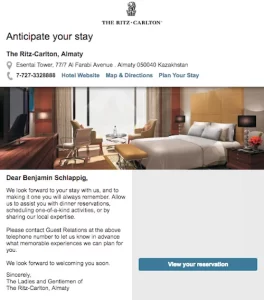
Video series: The Ritz-Carlton has produced several video series that spotlight different aspects of its brand and operations. One notable example is “The Art of the Craft” series, which explores the intricacies of the hotel’s renowned guest service philosophy. Other video series have focused on behind-the-scenes glimpses into the creation of signature cocktails, chef profiles, and destination guides.
Ritz-Carlton uses content marketing to showcase their properties and services. This includes high-quality photos and videos of their hotels, spa facilities, dining options, and local attractions. They often share stories of guest experiences, building an emotional connection with potential customers.
5. Influencer Collaborations
Influencer collaborations involve partnering with popular figures on social media who have significant influence over their followers. These partnerships allow brands like The Ritz-Carlton to tap into the reach and credibility of influencers to promote their products or services to a wider audience.
Here are some examples of how The Ritz-Carlton uses influencer collaborations as part of its marketing strategy:
Sponsored trips: The Ritz-Carlton invites select influencers to experience its properties firsthand by hosting them on sponsored trips. During these stays, the influencers document their experiences through social media posts, highlighting the hotel’s amenities, services, and destinations. For instance, fashion influencer Chiara Ferragni (@chiaraferragni) shared her visit to The Ritz-Carlton, Jordan where she enjoyed the beach, pool, and spa facilities. Her posts reached millions of followers, generating buzz around the property and inspiring potential guests to consider booking a trip themselves.

Co-created content: Another way The Ritz-Carlton works with influencers is by commissioning them to create original content that aligns with the brand’s messaging and values. For example, food influencer Jamie Oliver (@jamieoliver) teamed up with The Ritz-Carlton, Abu Dhabi Grand Canal, to develop recipes using locally sourced ingredients. His creations were featured on his social media accounts and the hotel’s website, showcasing both the property’s culinary excellence and its commitment to sustainability.
Ambassadorships: Some influencers become official ambassadors for The Ritz-Carlton, representing the brand in various capacities. Fashion designer Jason Wu (@jasonwu), for instance, serves as the Creative Director for The Ritz-Carlton Residences, Miami Beach. He has designed limited edition items for the residences, such as pillowcases and bathrobes, and participated in events and campaigns to further promote the development. As an ambassador, he brings a fresh perspective to the brand and helps attract a more fashion-conscious demographic.
By leveraging influencer collaborations, The Ritz-Carlton can effectively reach new audiences, build brand awareness, and position itself as a leader in luxury travel. Through strategic partnerships with influential individuals across diverse industries, the hotel chain can showcase its exceptional offerings, share authentic experiences, and foster meaningful connections with its target market.
6. Loyalty Program
The Ritz-Carlton Rewards Program (now part of the Marriott Bonvoy program) incentivizes repeat business. They offer exclusive benefits, such as room upgrades, late check-outs, and access to VIP lounges, to encourage loyalty among their guests. Here’s how The Ritz-Carlton Hotel Company utilizes this approach:
Marriott Bonvoy: The Ritz-Carlton is part of the Marriott International portfolio, which operates under the unified loyalty program called Marriott Bonvoy. Members earn points or miles for each eligible stay at any Marriott brand, including The Ritz-Carlton. They can then redeem these points for free nights, room upgrades, flights, and other benefits across the entire Marriott network. This program creates a sense of belonging among members and encourages repeat visits to any Marriott property.
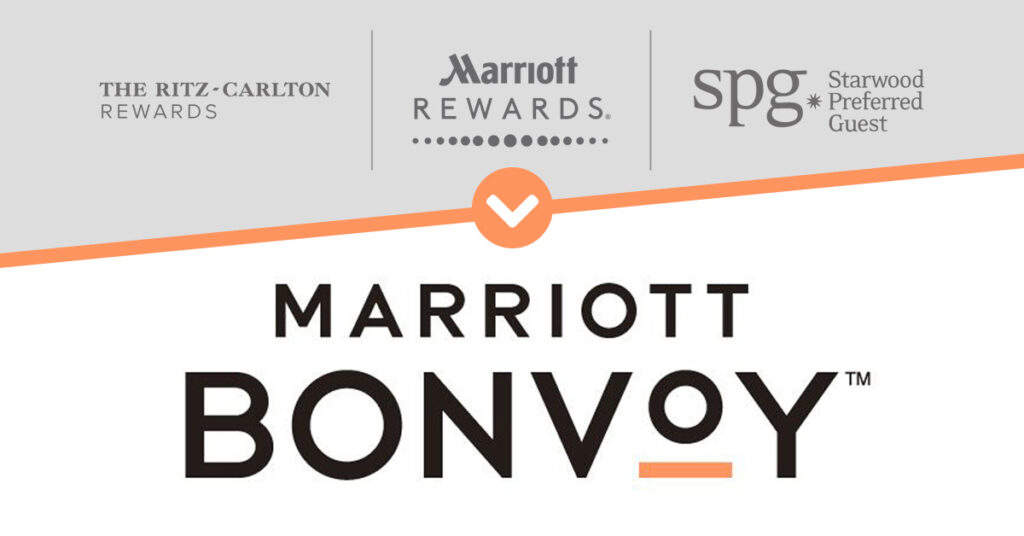
Exclusive perks: The Ritz-Carlton offers special privileges to its loyalty program members, such as early check-in/late checkout, complimentary breakfast, and customized experiences. For instance, the “Ritz-Carlton Rewards Memories” allows members to redeem points for once-in-a-lifetime experiences tailored to their interests, such as private cooking classes with Michelin-star chefs or VIP access to major sporting events. These personalized benefits strengthen customer relationships and enhance brand affinity.
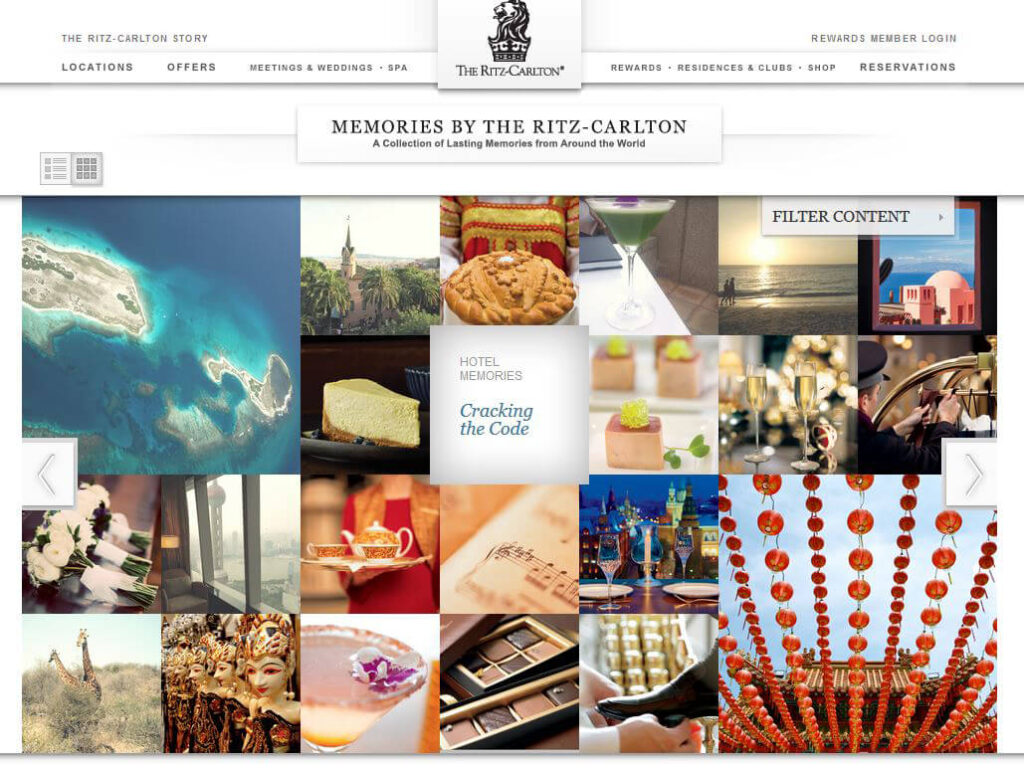
Tiers and status levels: Like most loyalty programs, Marriott Bonvoy features multiple tiers based on member activity. The higher the tier, the greater the benefits and perks. For The Ritz-Carlton specifically, members who qualify for the highest tier (Lumina Club) receive additional privileges like global luggage delivery, chauffeured services, and exclusive Lumina-only experiences. These differentiated benefits encourage members to maintain or increase their engagement with the brand, driving long-term loyalty.
Referral program: To leverage word-of-mouth marketing, The Ritz-Carlton introduced a referral program where existing members can earn bonus points by referring friends to join Marriott Bonvoy. When the referred friend signs up and completes a qualified stay, both parties receive reward points. By incentivizing current members to spread positive word about the brand, The Ritz-Carlton can expand its reach and attract new customers through trusted recommendations.
7. Community Engagement
Community engagement refers to initiatives aimed at connecting with local communities and promoting social responsibility. Here are some ways The Ritz-Carlton Hotel Company incorporates community engagement into its marketing efforts:
Local Partnerships: The Ritz-Carlton establishes partnerships with local organizations, charities, and nonprofits to support causes important to the surrounding area. For example, the Ritz-Carlton, Grand Cayman works closely with the Central Caribbean Marine Institute to protect marine life and promote sustainability practices. Such alliances not only benefit the community but also provide PR opportunities for the hotel to highlight its involvement and commitment to making a positive impact.
Volunteering and Philanthropy: Many Ritz-Carlton properties organize volunteer activities for employees and guests to participate in community service projects. These events range from beach cleanups to food bank donation drives, allowing participants to give back to the local community while also creating shared memories and fostering a sense of camaraderie. Additionally, The Ritz-Carlton Foundation supports various philanthropic endeavors around the world, further enhancing the brand’s reputation for corporate citizenship.
Cultural Immersion: The Ritz-Carlton actively promotes cultural immersion experiences for guests, helping them connect with local traditions, customs, and heritage. For instance, the Ritz-Carlton, Kyoto offers traditional Japanese tea ceremonies, flower arranging lessons, and kimono dressing workshops, giving visitors an opportunity to learn about and appreciate the host country’s culture firsthand. Such experiences not only create memorable moments for guests but also contribute to preserving local cultures and traditions.
In summary, Ritz-Carlton’s marketing strategies revolve around delivering exceptional experiences, maintaining a strong brand image, and using various channels to engage with their target audience. Their commitment to luxury, personalization, and customer satisfaction is at the core of their success in the competitive hospitality industry.
Marketing Mix of Ritz-Carlton
The marketing mix, often referred to as the 4Ps (Product, Price, Place, and Promotion), is a fundamental framework in marketing strategy. When applied to a luxury hotel brand like Ritz-Carlton, it helps in understanding how they deliver value to their customers. Here’s a detailed explanation of the marketing mix for Ritz-Carlton:
Product
-
- Luxury Accommodations: Ritz-Carlton is known for offering top-tier accommodations. Their rooms and suites are meticulously designed, featuring high-quality furnishings, luxurious amenities, and stunning views. The attention to detail in room decor and comfort is a hallmark of their product.
- Fine Dining: Ritz-Carlton properties often boast multiple high-end restaurants and bars, featuring gourmet cuisine prepared by renowned chefs. The dining experience is a vital component of the product, with an extensive wine and cocktail selection.
- Spa and Wellness: Many Ritz-Carlton hotels have world-class spa and wellness facilities. They offer a range of indulgent spa treatments, fitness centers, and wellness programs, contributing to the overall luxury experience.
- Event and Meeting Spaces: Ritz-Carlton provides event and meeting spaces for corporate events, conferences, weddings, and special occasions. These spaces are equipped with state-of-the-art technology and luxury amenities, catering to a diverse clientele.
Price
-
- Premium Pricing: Ritz-Carlton positions itself as a luxury brand and, consequently, commands premium pricing. Room rates, dining, spa services, and event bookings typically come at a high cost, reflecting the exclusivity and quality of their offerings.
- Seasonal Pricing: Prices may fluctuate depending on the season, local events, and demand. The Ritz-Carlton often offers special packages and promotions during off-peak seasons to attract guests.
Place
-
- Global Presence: Ritz-Carlton has a worldwide presence, with hotels and resorts strategically located in prime destinations. They can cater to both business and leisure travelers due to their diverse portfolio of properties.
- Direct Booking: Guests have the option to book directly through the Ritz-Carlton website or mobile app. This direct channel often offers exclusive promotions, discounts, and access to their loyalty program.
Promotion
-
- Content Marketing: Ritz-Carlton utilizes content marketing extensively to promote its properties. This includes visually appealing images and videos showcasing their hotels, dining experiences, spa treatments, and local attractions. They also share guest stories and testimonials, creating an emotional connection with potential guests.
- Social Media: Active on platforms like Instagram, Facebook, and Twitter, Ritz-Carlton engages with its audience by sharing captivating content. They run contests, respond to comments and inquiries, and maintain a strong social media presence to showcase their brand.
- Email Marketing: Ritz-Carlton sends personalized email campaigns to past guests and subscribers. These emails highlight promotions, upcoming events, and the benefits of their loyalty program, encouraging repeat visits.
- Public Relations: The brand often gains media coverage through partnerships, event sponsorships, and by hosting celebrities and dignitaries. Positive media coverage enhances their brand image and reinforces their luxury status.
- Partnerships and Collaborations: Collaborations with luxury brands, airlines, and influencers help extend their reach and credibility. These partnerships often involve co-branded promotions and exclusive offers.
The marketing mix of Ritz-Carlton revolves around offering a superior product, setting premium prices, strategically placing properties in key locations, and promoting the brand through captivating content and partnerships. Their commitment to luxury and exceptional service is reflected in each aspect of the 4Ps, attracting discerning travelers seeking a world-class experience.
Also Read: Checking in to Excellence: A Look at Hilton Hospitality Empire
To read more content like this, subscribe to our newsletter

